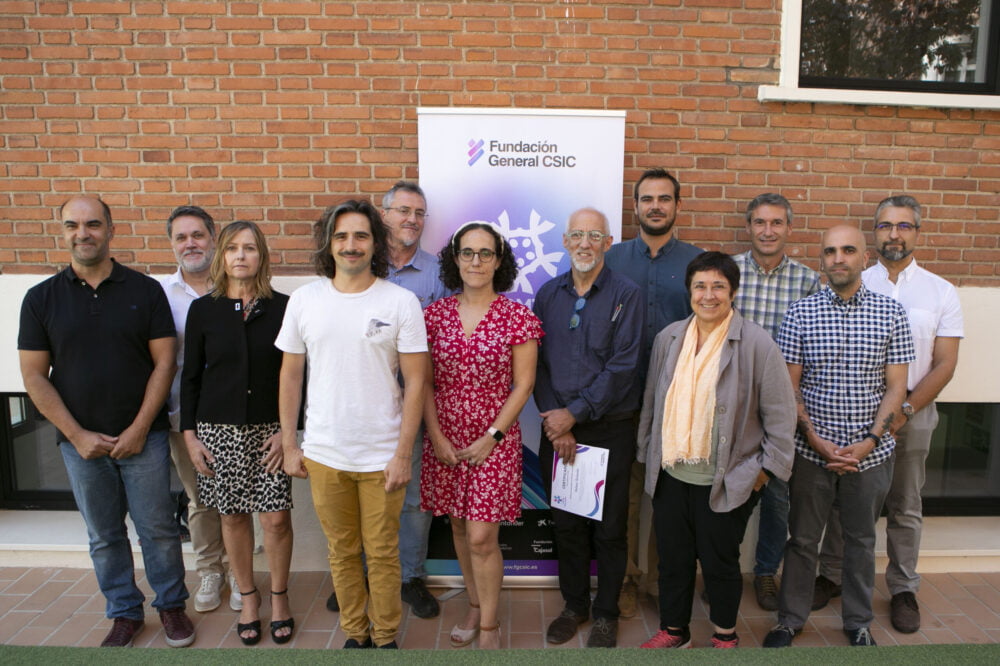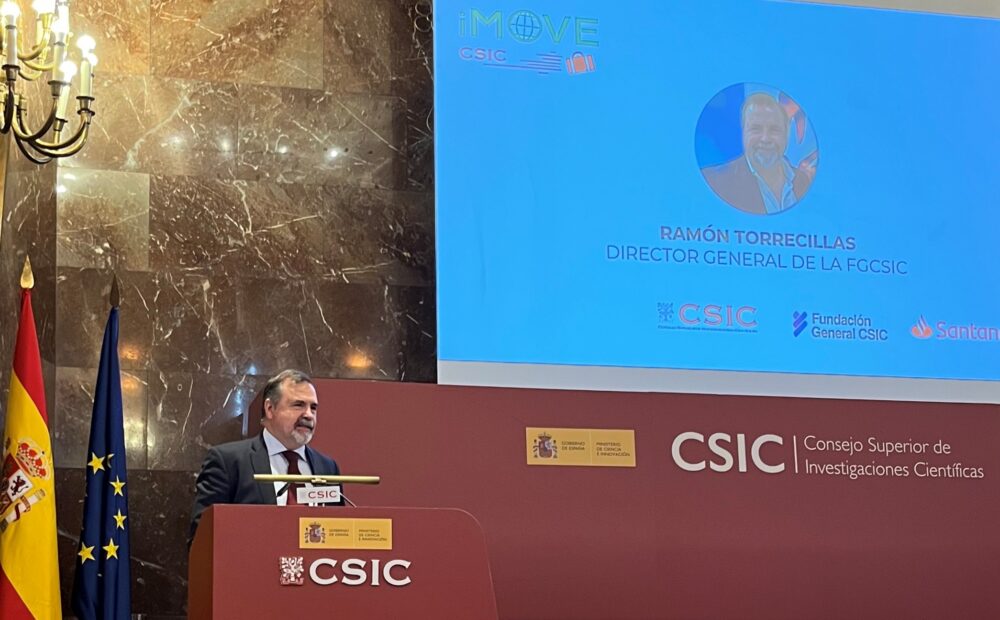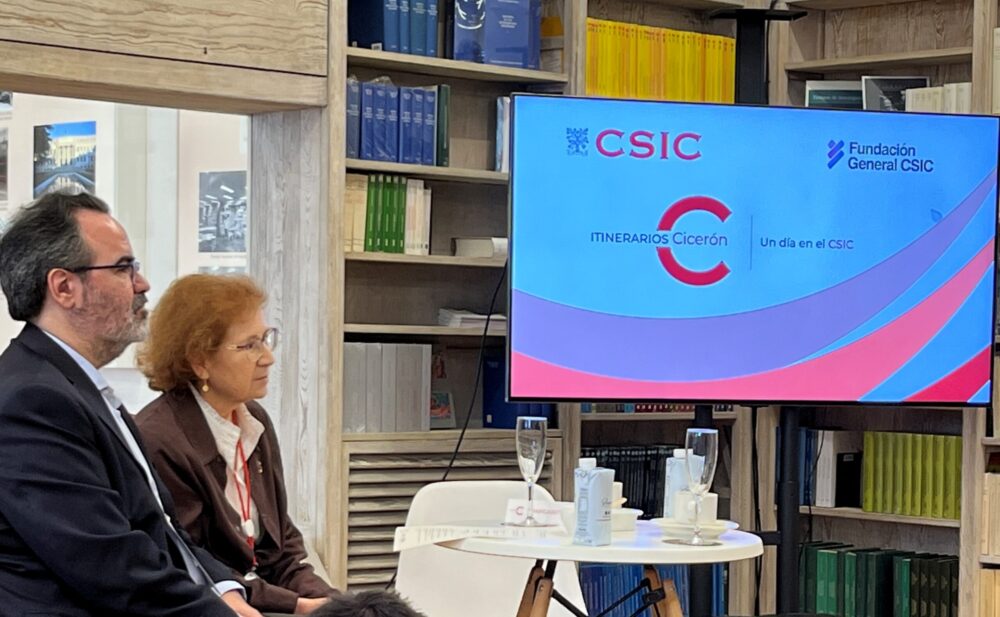The working group of the COMTE-Innovación 2022‘s edition, formed by experts from SECOT, FI Group and Fundación General CSIC (FGCSIC) has met today Thursday, September 8th, 2022, with the promoter teams of the eight beneficiary projects of this program, conceived to promote the valorisation of technological projects and knowledge generated by the CSIC’s research staff.
At the meeting, held at the Foundation’s Joaquín Costa headquarters, Ramón Torrecillas and Jorge Cabero (Managing Director and Director of Innovation at FGCSIC, respectively); Adolfo Torres (Treasurer and member of SECOT’s Board of Directors); and Miguel Carretero (FI Boost & FI Nvest leader at FI Group) took part in the meeting. They all underlined the importance of supporting this type of initiative and highlighted the high quality of the projects participating in this year’s edition.
After the institutional presentation of COMTE-Innovación and the work methodology on which the program is built, based on training sessions, technical consulting and mentoring, the project promoters have collected their accreditations and have taken a first contact with the teams of mentors who will help them to achieve a commercial exploitation of the results of their research.
Thus, the meeting held today is the starting point from which Fundación General CSIC, through COMTE-Innovación 2022, will support the following projects over the next 24 months:
AMIMAS: gAMma IMAging Systems
A technology based on a dual imaging system is proposed for use in oncological diagnostics and guided biopsies in real time. It consists of two novel devices that co-register gamma-ray images with ultrasound images, both for guiding breast biopsies and for radio guiding and monitoring minimally invasive surgical interventions. By integrating a precise morphological imaging technique, such as ultrasound, with the benefits of molecular imaging to discriminate tumours, in real time, this technology makes it possible to improve diagnosis and considerably reduce the number of biopsies required.
Promoter: Luis Caballero Ontanaya, from the Institute of Corpuscular Physics (IFIC, CSIC/UV).
BNCO2: Bacterial nanocellulose production from waste and greenhouse gases: CO2 capture, waste recycling and market product development
The proposal consists of a process for the production of nanocellulose, an emerging nano-biomaterial, from a home-grown bacterial isolate. The technology allows the biopolymer to be produced efficiently, both from agri-food waste and through a form of autotrophic growth from the CO2 greenhouse gas. The material obtained is of high quality and has a high potential to be used in a large number of applications related to nutrition, cosmetics, biofertilizers, electronics, special packaging and biomedicine, among other fields.
Promoter: Silvia Marqués Martín, from the Zaidín Experimental Station (EEZ-CSIC).
HIDECEL: iFABCell, smart hydrogels for efficient and controlled cell growth and detachment
The iFABCell technology offers a platform of “smart” biomaterials or hydrogels, capable of enabling a non-aggressive, efficient and controlled cell growth and detachment. Since proliferation can be maintained to allow confluence and monolayer formation, it is possible to harvest the entire monolayer and use it in cell therapy to improve the regeneration of certain lesions in the body (cartilage, skin, cornea, etc.). The iFABCell group has developed a line of thermosensitive hydrogel-coated containers for cell cultivation, aimed at R&D laboratories working on regenerative therapies.
Promoter: Carolina García Sánchez, from the Institute of Polymer Science and Technology (ICTP-CSIC).
LOGINN
This initiative proposes innovative solutions for the correct and sustainable exploration and exploitation of subsoil resources. It aims to apply technologies that improve exploration, evaluation of mineral resources, as well as their extraction and exploitation. LOGINN’s tools, based on artificial intelligence, consist of a hyperspectral probe and interpretation software. On the one hand, they integrate hyperspectral oriented and 3D visualization techniques and, on the other hand, interpretation systems for these images. By means of machine learning and deep learning, they make it possible to detect the minerals present in the rock, acquire images and generate 3D maps indicating the mineral composition.
Promoter: María José Jurado Rodríguez, from Geosciences Barcelona (GEO3BCN-CSIC).
FLOWBAT: Development, manufacturing and commercialization of redox-flow batteries and energy management systems
The project aims to develop an autonomous, high capacity, transportable, electric energy storage device with unlimited charge/discharge cycles, high performance and a useful life of 25 years. These would be vanadium redox-flow batteries, developed in Spain, with intelligent energy management and control systems, which present an excellent alternative to conventional batteries for large-scale energy storage. They have the advantage of having great operational flexibility, low environmental impact and very effective in smoothing electricity demand peaks.
Promoter: Félix Manuel Barreras Toledo, from the Laboratory for Research in Fluid Dynamics and Combustion Technologies (LIFTEC-UNIZAR/CSIC).
SUNLAS: Fabrication of nanocarbon supercapacitors using laser technology
Proposal aimed at the manufacture of supercapacitors formed by hybrid electrodes, based on two technologies to produce electrodes formed by hybrid composites of carbon nanostructures and metal oxides. The common link between the two is the use of laser processing to grow electrochemically active metal oxide nanoparticles on the surface of irradiated carbon nanostructures, in order to increase the energy density of the electrodes and maintain a high power density. Compared to commercial carbon-based supercapacitors, hybrid electrodes show great versatility and technical simplicity.
Promoter: Ángel Pérez del Pino, from the Institute of Materials Science of Barcelona (ICMAB-CSIC)
FLYGEAR: Acceleration of a technological innovation project for the automation of animal counting tasks
FLYGEAR is a high-precision automated system for measuring developmental time and vital transitions in D. melanogaster and other insects. It consists of a lightweight, easy-to-use and rugged device, consisting of a motorized platform that houses sample containers and a high-resolution infrared camera. A dual-motor design makes it possible for the camera to take 360o images of each sample. It also includes software developments for operating the robot and for analysing the images. The prototype developed allows scientifically validated data to be obtained with manually obtained data, increases accuracy and reproducibility, and is the most versatile automation solution of its kind on the market.
Promoter: María Domínguez Castellano, from the Institute of Neurosciences (IN-CSIC/UMH).
iDETEC (Universal Diagnosis of Infectious Diseases)
The project aims to develop a new diagnostic tool for infectious diseases, which will be much faster and more efficient than any of the current methods and will have the ability to diagnose all types of infections in a single test. Its implementation could prevent millions of deaths and reduce the enormous economic costs caused by infectious diseases. This tool is based on a recently invented technique, mechanical spectroscopy, which consists of identifying microorganisms (bacteria, viruses, cells, etc.) through the detection of their mechanical resonances.
Promoter: Eduardo Gil Santos, from the Institute of Micro and Nanotechnology (IMN-CSIC).
¡Muchas gracias a todos los que habéis participado en este primer encuentro celebrado en la nueva sede de @FGCSIC y nuestros mejores deseos para los proyectos #COMTE-Innovación 2022! pic.twitter.com/PJAzEUe86r
— Fundación General CSIC (@FGCSIC) September 8, 2022







